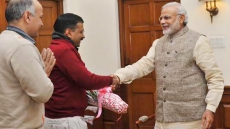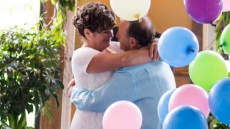Daylight saving time begins this weekend, with most Canadians setting their clocks ahead early Sunday.
As always, officials are using the moment to remind us it is a good time to replace the batteries in our smoke and carbon monoxide (CO) alarms.
Aside from battery maintenance, here are five things every homeowner should know about these life-saving devices:
1. Smoke and CO alarms don't last forever.
The average smoke alarm should be replaced every 10 years. CO alarms can last between seven and 10 years, according to Kidde Canada, a subsidiary of the world’s largest manufacturer of fire safety products.
Over time, internal sensors lose sensitively due to air contaminants and dust buildup.
"There's very low awareness about this," says Kidde spokeswoman Sharon Cooksey.
Every alarm should have its date of manufacture displayed on the back. But if it doesn't, take a close look at the colour of its plastic cover. If it's tan, brown or grey, chances are the device is due for replacement, Cooksey says.
For those seeking a low-maintenance replacement, some manufacturers offer alarms with sealed, 10-year batteries. They are more expensive than regular alarms, but the cost of replacement batteries is typically covered over the life of the product.
These long-term alarms typically emit an end-of-life chirp sequence when they are ready for replacement.
2. Carbon monoxide poisoning can fool you.
In the initial stages, the symptoms of carbon monoxide poisoning can mimic those of influenza. Headaches, nausea, dizziness and fatigue are all signs of CO poisoning — and the flu.
Without a properly functioning CO alarm, making the right call could be difficult.
Among the main sources of carbon monoxide are malfunctioning, non-electric heating and cooking devices — and portable generators brought indoors during power outages.
"When people think they're sick, they want to sleep it off," says Cooksey. "But you can't sleep off carbon monoxide poisoning."
3. Not all smoke detectors are created equal.
There are two basic types of smoke detector: photoelectric and ionization. Both are good at detecting fires.
However, photoelectric devices are particularly adept at detecting slow-burning, smouldering fires, while the ionization models are quicker at detecting fast-flaming fires, like cooking fires.
That's why it's better to have a photoelectric alarm in or near the kitchen, because it is less likely to go off every time you make toast.
4. Smoke and CO alarms are getting smarter.
Like virtually every home appliance, newer smoke and CO alarms offer tech-savvy consumers some nifty options.
Some manufacturers offer alarms that are interconnected, which means that once one alarm sounds, the others in the home automatically do too.
This can be particularly useful if there are detectors in the basement, where they might not be heard when everyone is asleep upstairs.
There are also combination smoke/CO alarms and advanced units that can send emergency texts or emails through a WiFi setup.
5. Carbon monoxide alarms have their place.
Carbon monoxide detectors should be installed on each level of your home in areas where there is good air circulation. A corner along the ceiling is a bad option.
Homes with non-electric furnaces should have a CO detector in the basement. And if there's only one detector for the bedroom area, it should be placed in a central location where everyone can hear it.




